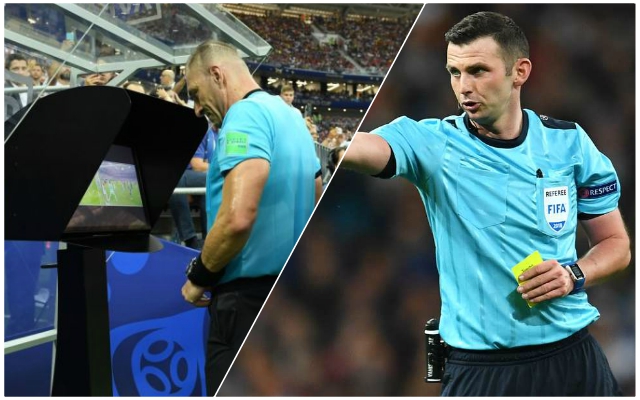Liverpool’s game against Norwich City is the first match of the 2019/20 Premier League season – and so Anfield will be the first stadium in the country to use VAR in a top-flight fixture.
Michael Oliver is the referee for #LFC v Norwich tomorrow. Refereed the Reds six times in the Premier League last season: five wins and one draw. Andre Marriner is the #VAR.
— Matt Addison (@MattAddison97) August 8, 2019
Most people will have seen VAR at the World Cup, but it will work slightly differently in the Premier League.
Announcements will be made over the PA system and on the electronic boards inside Anfield. The VAR, located in West London, will make clear to match controllers at Anfield what is being decided as and when VAR decisions are being made so they can pass on the message, which should avoid confusion.
Fans watching on TV will get the exact same message via the host broadcaster, which is Sky Sports in the UK for tomorrow’s game.
At stadia where there are big screens, some VAR reviews will be shown in real time to keep fans inside the stadium updated, but Anfield does not have the facilities to do this, hence the PA system and written messages on the scoreboard are being used instead.
READ MORE:
‘Bring him home, Jurgen!’: Reds fans react to Philippe Coutinho developments as Spurs are rejected
To make sure there is minimal interference from VAR, only four things are checked: goals, penalty decisions, mistaken identity and direct red card incidents.
Only VAR reviews which cause a delay in play will be communicated to fans, so any that go on while play continues will not be announced. That means that the experience should be the same as last season more often than not in terms of watching the match, given that most reviews will only be quick, while other things are happening.
If play continues while a decision is being checked, play will be stopped when the ball next goes dead – for instance, if it goes out for a throw-in or goal-kick – so nothing will be interrupted in that sense.
There will be pitchside monitors for the referee on the field to use, but the Premier League insist these will be used very sparingly – it won’t be like the World Cup where the referee spent a long time every game off the pitch deliberating. Most decisions will be made without the need for a screen.
VAR might not be to everyone’s taste, but it should make matches fairer. There’s nothing more frustrating than losing to a goal that shouldn’t have counted – and that should happen far less often with the technology in place.
